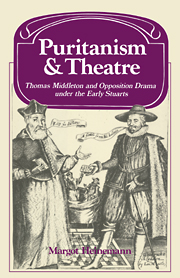Book contents
- Frontmatter
- Contents
- Introductory note
- 1 Time and Place
- 2 Puritanism, Censorship and Opposition to the Theatre
- 3 Middleton as Satirical Journalist
- 4 Early Satirical Comedies
- 5 How Anti-Puritan are Middleton's City Comedies?
- 6 Money and Morals in Middleton's City Comedies
- 7 Middle Years: Tragi-comedy and Moral Comedy
- 8 City Employments
- 9 Hard Times and Hengist, King of Kent
- 10 Political Satire: A Game at Chess
- 11 City Tragedy
- 12 Drama and Opposition, 1619–1640
- 13 From Popular Drama to Leveller Style: a Postscript
- Appendices
- Index
4 - Early Satirical Comedies
Published online by Cambridge University Press: 03 November 2009
- Frontmatter
- Contents
- Introductory note
- 1 Time and Place
- 2 Puritanism, Censorship and Opposition to the Theatre
- 3 Middleton as Satirical Journalist
- 4 Early Satirical Comedies
- 5 How Anti-Puritan are Middleton's City Comedies?
- 6 Money and Morals in Middleton's City Comedies
- 7 Middle Years: Tragi-comedy and Moral Comedy
- 8 City Employments
- 9 Hard Times and Hengist, King of Kent
- 10 Political Satire: A Game at Chess
- 11 City Tragedy
- 12 Drama and Opposition, 1619–1640
- 13 From Popular Drama to Leveller Style: a Postscript
- Appendices
- Index
Summary
Middleton found his right medium early. He was writing his first plays not later than 1602, when he was twenty-two, the earliest being two for Henslowe, now lost – Caesar's Fall, or Two Shapes and The Chester Tragedy, or Randal Earl of Chester. But his success began with the plays, mainly London comedies, that he wrote for the private theatres over the next eight years or so, and it is these that have mainly been quoted as evidence of his anti-citizen and anti-Puritan attitudes.
In his first years as a dramatist Middleton worked mainly for the boys' companies, particularly for the Children of Paul's (for whom he did six plays). This was the only period of his life when he was so closely linked with one company, and perhaps the only time when he may have been dependent entirely, or almost entirely, on his earnings from the commercial theatre for a living.
These early ‘city comedies’ both followed and helped to create a fashion for unromantic, realistic prose satire, though this does not imply that Middleton was simply imitating what Jonson or Marston had begun, against his own inclinations (in fact his satirical line is clearly though subtly distinguishable from theirs). An irreverent and cynical view of the acquisitive London of his time, where the weak and naive go to the wall and the greedy and ruthless lawyer, merchant and courtier take the profit, is what Middleton was also showing in The Black Book and Father Hubbard's Tales, where he was not directly tied by a Paul's or Blackfriars audience.
- Type
- Chapter
- Information
- Puritanism and Theatre , pp. 63 - 72Publisher: Cambridge University PressPrint publication year: 1980

